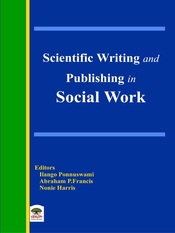|
Ilango Ponnuswami, Abraham P. Francis, Nonie Harris, pp. XIV+226=240, Rs. 850, Niruta Publications The context As a visiting scholar of The Cairns Institute, Professor Ilango Ponnuswami from Bharathidasan University, Tiruchirappalli, India had the opportunity in 2012 to work and collaborate with staff of Cairns Institute as well as social work academics of James Cook University(JCU) in North Queensland, Australia. These collaborations led to recognition that many of the challenges and dilemmas of scientific writing and publicationwere relevant to both the Indian and Australian contexts and that a meaningful cross-national collaboration would potentially enrich the learning experiences of students and staff in both locations. Subsequently the editors of this book, Professor Ponnuswami, and Dr Francis and Dr Harris from JCU, conducted a three day residential Scientific Writing and Publication Workshop (in January 2013), for social work faculty members and research scholars, at the Karl Kubel Institute of Development Education (KKID) in Coimbatore, Tamil Nadu. This book is a tangible outcome of this international, academic collaboration and, most importantly, is the result of the KKID participants’ scientific writing endeavors begunat the 2013 workshop in Coimbatore. This international collaboration directly aligns with James Cook University’s Faculty of Arts Education and Social Sciences’ (FAESS) Faculty Plan. The Plan specifically commits the Faculty to activities and endeavors that “increase links with other Universities in the tropics and encourage staff and student collaboration and exchange” (PC2.3). The international collaborative activity and publication outcome also align with the JCU’s commitment to creating a brighter future for life in the tropics through a project that contributes to “the experience of new cultures, particularly … a new educational culture, [and] is also an opportunity for some creative thinking about how new knowledges are formed and generated” (McGinty, Koo and Saedi, 2010, p. 518). Research and Writing in Social Work As social work educators we, the editors, shared a common belief that the activities of research, writing and publication are fundamental to who we are as social work practitioners and that it is an incredible privilege to be involved in the process of creating knowledge – which is what the research and writing processes allow us to do. We recognize that social work practice is changing and that research is now an integral part of practice. The need for practitioners to be able to engage in researchis becoming more important both for clients, organizations and communities. We should assume that research and practice are not mutually exclusive and that as practitioners committed to social justice and human rights, we are also researchers (and writers and publishers) who embrace these same commitments. The Australian Association of Social Workers states that: ‘Research is key to the continued development of the theory and knowledge base of social work practice’ (2008, p. 6). This professional practice standard emphasises the importance of the creation of an evidence base to inform our practice; that as social work practitioners we continue to monitor and evaluate what we do in a structured way; and that through these processes we are accountable for the quality and effectiveness of our practice. Practitioners also need to undertake research to determine the needs of clients, to test new ideas and to confirm practice wisdom. Research underlies the accomplishment of all of these expectations. However, as McMahon (2008) reminds us, undertaking research although important, is not sufficient- “doing research is a process of self-empowerment for the individual researcher but empowerment can begin and end with the individual unless the message gets published and broadcast to the wider context” (McMahon, 2008, p. 49). Giving written voice to our knowledge should be our priority. References 1.Australian Association of Social Workers.(2008). AASW practice standards for social workers. Canberra: AASW. 2.Faculty of Arts Education and Social Sciences.(2012). Faculty triennium plan 2013 – 2015. Townsville, Australia: James Cook University. 3.McGinty, S., Koo, Y. and Saeidi, M. (2010).A Cross-country Study on Research Students’ Perceptions of the Role of Supervision and Cultural Knowledge in Thesis Development. International Journal of Inclusive Education, 14: 5, 517-531. 4.McMahon, A. (2008). From Consumers to Creators: The Importance of Getting Your Work Published. Ngoonjook: A Journal of Australian IndigenousIssues.32, 37-50. Ilango Ponnuswami Professor and Head, Department of Social Work, Bharathidasan University, Tiruchirappalli, Tamil Nadu, India. Abraham Francis Lecturer, Department of Social Work and Human Services, James Cook University, Queensland, Australia. Nonie Harris Senior Lecturer, Department of Social Work and Human Services, James Cook University, Queensland, Australia.
2 Comments
Bhavanishankar. P
9/15/2016 07:32:00 pm
Really nice and informative book. We can understand the research problems in Social Work, and we get an idea to write our thoughts effectively. We proud about ourselves to say Pro. Illango sir is very familiar to us. God give him a healthy life forever.. Amen
Reply
Ilango Ponnuswami
9/15/2016 08:24:11 pm
Thanks very much for your kind words and wishes dear Bhavanishankar.
Reply
Your comment will be posted after it is approved.
Leave a Reply. |
20,000 HR PROFESSIONALS ARE CONNECTED THROUGH OUR NIRATHANKA HR GROUPS.
YOU CAN ALSO JOIN AND PARTICIPATE IN OUR GROUP DISCUSSIONS. Categories
All
|
||||||
SITE MAP
SiteTRAININGJOB |
HR SERVICESOTHER SERVICESnIRATHANKA CITIZENS CONNECT |
NIRATHANKAPOSHOUR OTHER WEBSITESSubscribe |
MHR LEARNING ACADEMY
50,000 HR AND SOCIAL WORK PROFESSIONALS ARE CONNECTED THROUGH OUR NIRATHANKA HR GROUPS.
YOU CAN ALSO JOIN AND PARTICIPATE IN OUR GROUP DISCUSSIONS.
YOU CAN ALSO JOIN AND PARTICIPATE IN OUR GROUP DISCUSSIONS.
|
|


 RSS Feed
RSS Feed





